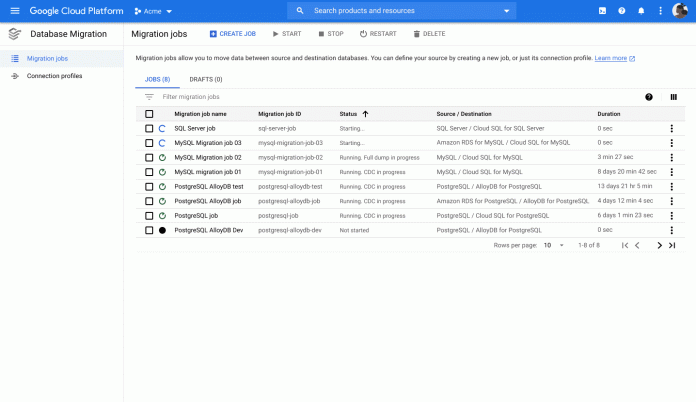In December 2022 we announced the general availability of AlloyDB for PostgreSQL, a fully-managed, PostgreSQL-compatible database service that provides a powerful option for modernizing from legacy, proprietary databases and for scaling existing PostgreSQL workloads. Earlier in 2022, we launched the preview of AlloyDB for PostgreSQL migrations using Database Migration Service (DMS). Today we’re thrilled to announce the general availability of DMS for AlloyDB migrations from PostgreSQL sources.
As customers look to standardize on AlloyDB for PostgreSQL, they expect a smooth migration path. They need a solution that is easy to set up and use, with no management overhead. Additionally, it should be trusted to move data accurately and securely, while causing minimal disruption to their applications. And that’s what the Database Migration Service offers.
AlloyDB for PostgreSQL provides a range of benefits that makes it an attractive choice for a target database. It unlocks better scalability, higher availability, and faster performance compared to open-source PostgreSQL. In our performance tests, AlloyDB is more than 4x faster for transactional workloads and delivers up to 100x faster analytical queries than standard PostgreSQL. With its full compatibility with PostgreSQL, leveraging this technology is seamless and effortless.
While AlloyDB offers significant performance improvements over traditional PostgreSQL databases, it needs to meet our customers’ migration requirements. DMS provides an easy-to-use migration solution with no management overhead. It also provides accurate and secure data transfers, minimizing disruptions to applications, making it a reliable choice for organizations looking to transition to it as their standard database solution.
What we’ve learned in the preview
Since launching DMS support for AlloyDB migrations, we’ve helped businesses of all sizes improve their database performance, scalability, and availability. Our customers have benefited from features like index advisor and adaptive autovacuum, which have reduced management overhead and improved performance. We’ve also helped customers achieve higher application availability by migrating to AlloyDB’s highly scalable and resilient infrastructure. Full PostgreSQL compatibility and transparent pricing makes it easy to take advantage of this technology.
DMS provided those customers with a fast, serverless, and secured migration path from PostgreSQL sources to AlloyDB for PostgreSQL, regardless of whether their source was located in on-premises databases, self-managed databases on Google Cloud, or cloud databases such as Amazon Aurora.
“Using DMS was really amazing, the configuration and setup was extremely simple and we were able to migrate our workloads without absorbing downtime. Once we landed in AlloyDB we were amazed how seamless and perfect the experience was where it met all of our requirements including handling our peak traffic,” said Hiroaki Karasawa, Full-stack Node.js development and Cloud Native infrastructure manager at dinii inc.
“As a cloud-based SaaS ticketing platform, data continuity and system uptime are critical to our operations. We used DMS to move from Amazon Aurora to Cloud SQL in 2021, and at the end of 2022, used it again to migrate to AlloyDB for PostgreSQL. Our primary concern was minimizing downtime, and this is where DMS proved its mettle,” said Oliver Morgan, CEO at Ventrata. “The beauty of DMS lies in its simplicity and reliability. The simple reality is we would still be on Amazon Aurora if it wasn’t for Google’s DMS, and to have performed two significant database migrations in the course of a year has given our team the flexibility to keep up with the latest and greatest products cloud providers like Google Cloud have to offer.”
What’s new in the GA version
The GA version offers enhanced security with Customer-Managed Encryption Keys (CMEK), for organizations with strict encryption policies. CMEK is now available for PostgreSQL to AlloyDB migrations, giving you greater control over the keys you use to encrypt data at rest, ensuring the highest level of data protection during the migration process and beyond.
Many Google Cloud services support CMEK (here is the list of supported services). When you protect data in Google Cloud services with CMEK, the CMEK key is within your control.
Migrating to AlloyDB using Database Migration Service
Migrating to AlloyDB is easy with DMS. To start, navigate to the Database Migration page in the Google Cloud console, create a new migration job, and take these five simple steps:
Choose the database type you want to migrate, and see what actions you need to take to set up your source.
Create your source connection profile, which contains information about the source database. The connection profile can later be used for additional migrations. Here you can set up your Customer-Managed Encryption Keys (CMEK).
Create an AlloyDB for PostgreSQL destination cluster that fits your business needs.
Define a connectivity method: DMS offers a guided connectivity path to help you connect.
Test your migration job and get started whenever you’re ready.
Once the migration job starts, DMS takes an initial snapshot of your data, then replicates new changes as they happen. The migration job will continue to replicate the source data until you decide to initiate the cutover. Once Cutover is initiated, the replication stops, and you can redirect your application to use your brand new AlloyDB cluster, which is ready with all your source data.
Learn more and start your database journey
For more information to help get you started on your migration journey, head over to the documentation or start training with this Database Migration Service Qwiklab. You can get started with an AlloyDB free trial by navigating to the AlloyDB console and creating your first cluster. And to get started with the new Database Migration Service for PostgreSQL to AlloyDB migrations, simply visit the database migration page in the console.
Cloud BlogRead More


